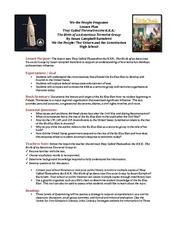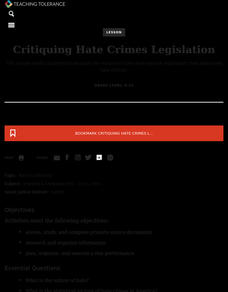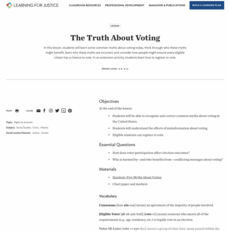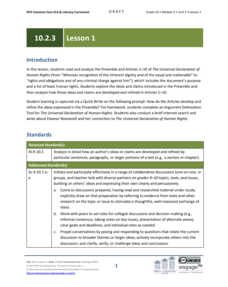Curated OER
Who Are the Arab Americans?
Students explore the concept of diversity. In this Teaching Tolerance lesson, students take a quiz titled "Who Are the Arab Americans?" and then use the quiz as a lens through which to discuss misperceptions regarding Arab Americans....
Curated OER
The Great American Bank Robbery
Students examine the economic crisis of 2008. In this banking bailout lesson, students read the provided articles "Nicole Bradbury: Robo-Signer Victim," and "Bankers' Sloppy and Illegal Work." Students respond to the provided...
Curated OER
The United States Flag
Students study the United States flag. For this American history and government lesson, students define and give examples of familiar symbols. Students design a classroom flag. Students identify and describe the American flag.
Curated OER
Distinguishing Between Levels of Government
Twelfth graders study confederal, federal, and unitary governments. They compose an essay that compares and contrasts the purpose of state/local government with that of the national government in the American federal system.
Curated OER
US Government: Foreign Policy
Students explore the basic precepts of American foreign policy. In this diplomacy lesson, students read textbook chapters regarding American foreign policy practices before and after World War II. Students also watch a...
Alabama Learning Exchange
Learning About Our Government
learners about the organization of our nation's government. They are introduced to the three branches of American government and the responsibilities of each. They discuss the requirements for becoming President.
Curated OER
Why were Americans upset with the British Government?
Fourth graders examine the Revolutionary War in New York State. In this experiential hook instructional activity, 4th graders adhere to new rules imposed by the teacher. Students document their feelings and frustrations with being...
Curated OER
LESSON PLAN: CONTROLLING NUCLEAR WEAPONS: DEBATING THE NON-PROLIFERATION TREATY
Ninth graders examine various nuclear weapons. For this American Government lesson, 9th graders conduct primary source research to investigate nuclear weapons and the international nuclear Nonproliferation Treaty. Students compose a...
Curated OER
African Americans in the Civil War
Students examine the contributions of African American soldiers during the Civil War. In pairs, they complete Civil War timeline worksheets. They use character cards to assume the identities of African Americans and determine whether or...
Curated OER
The Called Themselves the K.K.K.; The Birth of an American Terrorist Group
How did Ku Klux Klan develop and flourish in the US? How did the government respond to acts of terrorism conducted by the KKK following the Civil War? How does the government respond to acts of terrorism today? This resource...
National Endowment for the Humanities
Kennewick Man: Science and Sacred Rights
"Have respect for the dead!" Scholars investigate how science and religion often clash. As they look into the laws of science and the laws of religion, the legal ramifications at the federal level of both play into an argument they...
Curated OER
Depicting the Piscataways: The Government of Maryland Student Booklet
Fourth graders construct an original booklet that consists of summaries and artwork dealing with their study of the state of Maryland. They work on this booklet after their study of the Piscataways, a Native American tribe in Maryland,...
National Endowment for the Humanities
Victory and the New Order in Europe
A New Order in Europe calls for a new lesson plan! This third plan in a series of four sequential lessons encourages high schoolers to read primary sources about the development of the New Order and follow up their knowledge with a...
Teaching Tolerance
Critiquing Hate Crimes Legislation
The high school instructional activity explores what hate crimes are and how the government has responded to those crimes. Academics read legislation, analyze political cartoons, and complete hands-on-activities to understand what...
Curated OER
American Heritage Themes
Pupils define freedom, unity, progress, and responsibility in relation to American Heritage. They explore the origin of how American Heritage was developed and ways in which they can continue it today. They also determine ways they...
John F. Kennedy Presidential Library & Museum
Military Advisers in Vietnam: 1963
How did the beginning of the Vietnam War factor into the Cold War with the Soviet Union? As part of a study of American involvement in Vietnam, class members read a letter address to President Kennedy and his response in which...
K20 LEARN
Whose Manifest Destiny? Westward Expansion
Your land is my land! Young historians investigate the concept of Manifest Destiny used by the United States government to justify western expansion. Jigsaw groups read primary source documents to gain an understanding of the movement...
Curated OER
Central American Immigrants to the United States: Refugees from Unrest
Students identify the major aspects of Olmec and Mayan civilzations, including economic, political, and religious. They list contributions of these civilizations. Students identify the Central American countries where the United States...
Teaching Tolerance
The True History of Voting Rights
Explore what voting rights really are in an intriguing instructional activity that explores the history of American voting. The resource examines the timeline of voting rights in the United States with group discussions,...
PBS
Stereotypes vs. Statistics (Grades 4-8)
Stereotypes can be painful if they are used to discriminate against others. Statistics, however, can be helpful in dispelling myths propagated by stereotypes. Using a thoughtful lesson plan, scholars complete graphic organizers...
Teaching Tolerance
The Truth About Voting
True or False: Only Presidential elections matter. Academics delve into common voting myths to understand what is true and why the election process is critical to democracy. The lesson uses group discussion, activities, and handouts to...
National Endowment for the Humanities
The Omnipotence of the Majority
While the American system is based on the idea of almost-universal suffrage for adults, great thinkers have had concerns about this system of governance. Using classic writings from Alexis de Tocqueville and videos highlighting thinkers...
EngageNY
Grade 10 ELA Module 2: Unit 3, Lesson 1
Scholars examine the Universal Declaration of Human Rights and analyze the ideas in the preamble. Readers define new vocabulary words, listen to a Masterful Reading, answer questions in pairs, participate in a jigsaw discussion, and...
Curated OER
Learning About the Kumeyaay Indians
Third graders research the Native American nation of Kumeyaay. Scholars use the internet to research past history. Through email, 3rd graders communicate with a Kumeyaay child to discover life on a present day reservation. They create a...

























